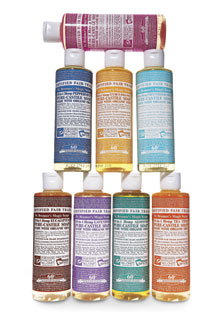Containers
- Large plastic spray bottles: I prefer 26-32 ounce bottles. Most recipes call for a large bottle like that.
- Small glass jars, such as 4-ounce canning jars: I think these are cheapest at a place like Target or Bed, Bath & Beyond instead of online. I got a 12-pack for $10.50 at BB&B. I like the smaller jars best because it's easiest to dip a rag into or get my hand into it, if needed. You may also want a few larger glass jars.
- Dark-colored glass spray bottles: Get at least a couple 4-ounce bottles or bigger. You'll need glass jars and bottles for anything that you add an essential oil to because essential oils break down plastic, which means your good-intending, DIY natural cleaner would be toxic. I think you can store essential oils in stainless steel and plastics that are #7 and up, but those are rare and I'm not positive on that. I'm still doing some essential oil research.
 |
| photo credit: Oprah.com |
- Distilled white vinegar: Get at least one gallon; or get in bulk from Costco. Use straight, undiluted distilled white vinegar for cleaning stainless steel. Vinegar is the base of many DIY cleaning recipes and is pretty good at killing germs, especially when paired with other natural cleaners.
- Liquid Castile Soap: Dr. Bronner's brand (pictured) is easy to find at health stores and Target. It's very concentrated, so you'll dilute it or use tiny amounts when you use it. Dr. Bronner's brand has many suggestions for how to use it on its label; I'll give you mine. The bar soap is nice for hand-washing.
- Baking soda: Great for scrubbing!
- Tea tree essential oil: The link to this particular tea tree oil can't be taken internally. The known cleaning properties of tea tree oil are antimicrobial, antiseptic, antiviral, bactericidal, fungicide, and insecticide (Dessinger, Heather. DIY Non-Toxic Cleaning Recipes. 13). Basically, tea tree oil GETS IT DONE!
- Rubbing alcohol: A great cleaner when the acidity of vinegar is too harsh (Dessinger, Heather. DIY Non-Toxic Cleaning Recipes. 10).
- Hydrogen peroxide: "One of the only natural substances that labs have shown to be an effective disinfectant. Also helps remove hard water deposits from dishes and serves as a natural bleach" (Dessinger, Heather. DIY Non-Toxic Cleaning Recipes. 9).
- Olive oil: Use for leathers and woods.
- Optional: Other essential oils for a good scent and/or killing germs. Recommendations will be given with each cleaner.
Coming soon: An exciting announcement for the development of this blog!!
No comments:
Post a Comment